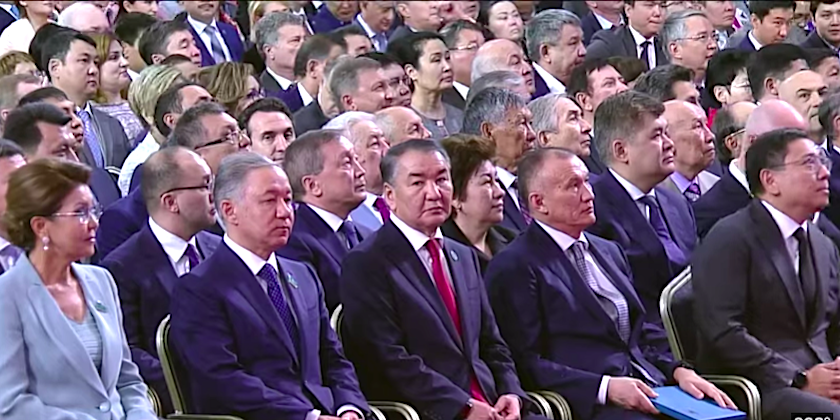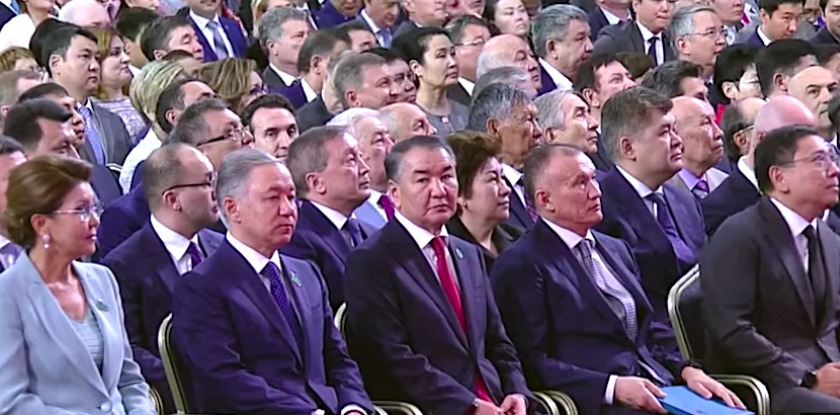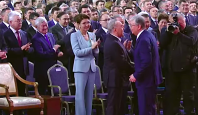Kazakhstan is undergoing a serious internal political crisis caused by the failure of Nursultan Nazarbayev’s policies. For the Kazakh citizens, this crisis is particularly apparent due to the domination of the consumerist sentiment and the growth of the social division in the country.
We believe it is the recognision of these developments (which of course does not eliminate the health factor) that had forced the Leader of the Nation to pull off the hat trick and hand the presidential chair over to his successor while continuing the previous political line and retaining the overall control over the authoritarian political system and the super-presidential vertical.
However, the necessity of conducting a number of formal procedures including the early presidential elections that have legitimized Kasym-Zhomart Tokayev as the new President has resulted in the awakening of the groups of people who, for one reason or another, do not agree with the current developments.
Note that their disagreement has to do with a rather wide range of issues, from the size of the social support given to families with many children and the lack of opportunities to provide the children with a high-quality education to the very fact that monarchy de-facto exists in Kazakhstan under the leadership of Nursultan Nazarbayev and that his clan does not simply dominate the country but massively abuses its power.
This awakening had resulted in the May and June protestations that consisted of people of all ages, ethnicities and social standings.
In our opinion, the protesters can be tentatively divided into three groups:
- the civil activists - both independent and representing the former opposition,
- “the hipsters”,
- the low-lives of the Kazakh origin who seem to be living in the urban and suburban districts chosen by the newcomers from rural areas as a place of residence where the level and the quality of life are particularly poor.
The authorities suppress all these groups in an equally harsh manner. Having said that, we must keep in mind that, in certain cases, there are the factors that lighten the pressure on the part of siloviki.
With that, the fashion in which the authorities operate cannot but surprise one. When suppressing the 9-12 June protests, Akorda de-facto employed the practices of large-scale repressions in the style of 1937, i.e.:
- completely abandoned the principle ‘innocent until proven guilty’ while detaining, jailing and punishing everyone within the reach of their hands – actual protesters, casual observers and even innocent by-passers,
- massively deprived the citizens of the right for legal defense or presented them with the so-called state defenders,
- reached judicial verdicts in a quick manner and at night-time often taking the accused away to a different locale.
All this signifies that the Kazakh authorities were caught off guard by this relatively massive-scale negative reaction of the citizens. And, upon encountering it, they were forced to act in a rushed manner, with the severe and systemic violations of the citizens’ rights including those set in the Kazakh Constitution.
Kazakh human rights activist Evgeniy Zhovtis attributes this curious fact to the division of the previously united super-presidential vertical into two branches – the civic one and the law-enforcement one.
When Nursultan Nazarbayev handed over the presidential powers to Kasym-Zhomart Tokayev, the Presidential Administration lost any kind of direct influence on the law-enforcement agencies placed under the authority of Security Council. Note that Security Council is chaired by Secretary Kalmukhanbet Kasymov known in the country for his December 16, 2011 direct order to shoot the peaceful citizens protesting in Zhanaozen (for which he’s got his nickname - “the Zhanaozen butcher”).
We believe that, even if Akorda manages to rectify the deeds of law-enforcers who have lately been enjoying the support of the so-called ‘titushki’ (street mob), this is not going to affect the growth of the protest sentiment that has now moved from social networks and kitchens to actual streets. Moreover, judging by the activity of the Kazakhs on social media and by the number of videos depicting all kinds of violations on the part of the state, the authorities have lost the information battle to the civil society.
However, the biggest problem for Nursultan Nazarbayev, Kasym-Zhomart Tokayev, Karim Masimov, Dariga Nazarbayeva and others lies in the fact that their capabilities for suppressing the protest sentiment are limited by the number of siloviki and titushki: minus those engaged in pushing papers around, the number is unlikely to exceed a hundred thousand people. Nation-wide.

This means that, if the number of protesters is to rise exponentially, Akorda’s prospects may not turn out to be too bright. And the probability of the realization of this scenario is quite high given that siloviki are provoking the peaceful citizens to show resistance by acing in a harsh manner, employing unnecessary violence and completely disregarding the law and the rights of the citizens.
As a result, Akorda has de-facto been left with only two working instruments: the massive employment of titushki (in order to simply scare off the protesters) and the use of firearms Zhanaozen-style or even of armored vehicles as it was done in China 30 years ago.
Backing down and stepping back is not an option for Akorda, Nazarbayev and Tokayev since, in the countries like Kazakhstan, these things are regarded as a sign of weakness and not as a manifestation of intelligence and reasonableness. Therefore, the probability of a fierce confrontation between the protesters and siloviki is rather high, and this confrontation may result in the use of firearms against the former. Then the relationships between the authorities and the people may change drastically.
Considering that, despite the big investments in Zhanaozen made by the state after the tragic events of December 2011, the Kazakhs have not forgotten about this tragedy, there is a high chance that Kazakhstan may… well, not slip into a civil war (we believe this is highly unlikely) but encounter a civil showdown.
And since Akorda’s actual capabilities for suppressing the protesters are seriously limited, the authorities will find themselves a hostage of the situation. If, instead of hundreds, tens of thousands of people take to streets in Almaty and Nur-Sultan, not to mention across the entire nation, the situation will start changing so rapidly that it will be no longer feasible to control it from the top.
In this context, the civil society becomes the key player. However, for Akorda, the trouble lies in the fact that the country has no political opposition. In other words, at the time when the refusal to negotiate is becoming more and more dangerous for the authorities, the latter simply have no one to negotiate with.
Therefore, detaining several hundreds of people and punishing them with administrative arrest is nothing against what may happen in the future if the confrontation between the authorities and the civil society continues. The main problem, we repeat, lies in the absence of either a mechanism for achieving a consensus or the readiness to stand in opposition.
We believe Akorda will hold firm and continue its current domestic policy with its main task of preserving the status quo and the proverbial internal political stability. The protesters, in their turn, will continue to act disjointly. Perhaps it will take several serious failures for the leaders of the protest groups to start talking to each other and agreeing on acting together.
As for Kasym-Zhomart Tokayev becoming a new national leader and mobilizing the civil society and the state apparatus for achieving the common goals, the chance for that is zero. So, we can only count on new politicians who will be able to not simply lead their fellow citizens in a certain direction but to negotiate with the current authorities and with each other and to achieve results.
In our opinion, this may happen in two or three years. When the socio-economic standing of most Kazakh citizens gets even worse while the expansion of the social state support reaches its limit. For the budget expenditures cannot grow infinitely.






